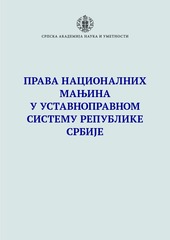Приказ основних података о документу
Сто година (не)толеранције: националне државе, хибридност и балканизација
Hundred years of (in)tolerance: national states, hibridity and Balkanization
| dc.creator | Лазаревић Радак, Сања | |
| dc.date.accessioned | 2020-10-27T13:57:00Z | |
| dc.date.available | 2022-01-03 | |
| dc.date.issued | 2019 | |
| dc.identifier.isbn | 978-86-7025-811-2 | |
| dc.identifier.uri | https://dais.sanu.ac.rs/123456789/9346 | |
| dc.description.abstract | Увид у европске и америчке дипломатске извештаје о „европској Турској“, „Балкану“, те ономе што се данас у јавном дискурсу назива „Југоисточном Европом“, сведочи о амбивалентном односу према њеном културном и етничком саставу. Од раног деветнаестог, па до краја прве половине двадесетог века он се означава као хибридан, „неприродан“ и несвојствен Европи. Са овим у вези, јавља се термин „балканизација“ који се до данас употребљава са негативном политичком конотацијом. У раду се преиспитује: 1. веза између стварања националних држава, мултикултуралности и употребе термина „балканизација“; 2. динамична улога представе о хибридности и мултикултуралности; 3. њен однос према захтевима у вези са правима националних мањина. | sr |
| dc.description.abstract | With a distance of one hundred years, Serbia and the societies in the region are recognized as multicultural. Diplomats coming from countries that supported the Right of Peoples to self-determination support the autonomy of societies that once belonged to the Austro-Hungarian Empire and the Ottoman Empire. In the Balkans, people are called by “hybrids’’ or a mixture of people, races and cultures. This population relates to civilization backwardness and disease, and thus, diplomats send an ambivalent message about their internal relations. Officially, they express concern about the future of these countries, but also the fear that hybridity might be reflected on their own societies. By the end of the 19th century, the term balkanization was introduced. It indicates fragmentation and intolerance in the region. This term is based on the so-called Balkan myth, but adapted to meet new needs. This paper analyzes the relationship between concepts of hybridity, multiculturalism, nation, national state and balkanization. The analysis shows dynamic and flexible nature of the mentioned terms. | en |
| dc.language.iso | sr | sr |
| dc.publisher | Београд : Српска академија наука и уметности | sr |
| dc.rights | embargoedAccess | sr |
| dc.rights.uri | https://creativecommons.org/licenses/by-nc-nd/4.0/ | |
| dc.source | Права националних мањина у уставноправном систему Републике Србије : зборник радова са Округлог стола одржаног 27. новембра 2017. | sr |
| dc.subject | hybridity | sr |
| dc.subject | national state | sr |
| dc.subject | balkanization | sr |
| dc.subject | Serbia | sr |
| dc.title | Сто година (не)толеранције: националне државе, хибридност и балканизација | sr |
| dc.title | Hundred years of (in)tolerance: national states, hibridity and Balkanization | en |
| dc.type | conferenceObject | sr |
| dc.rights.license | BY-NC-ND | sr |
| dcterms.abstract | Lazarević Radak, Sanja; Sto godina (ne)tolerancije: nacionalne države, hibridnost i balkanizacija; | |
| dc.citation.spage | 153 | |
| dc.citation.epage | 165 | |
| dc.description.other | Научни скупови / Српска академија наука и уметности ; књ. 177. Одељење друштвених наука, Одбор за проучавање националних мањина и људских права ; књ. 42 | sr |
| dc.identifier.cobiss | 525519765 | |
| dc.type.version | publishedVersion | sr |
| dc.identifier.fulltext | http://dais.sanu.ac.rs/bitstream/id/39260/rad11.pdf | |
| dc.identifier.rcub | https://hdl.handle.net/21.15107/rcub_dais_9346 |

